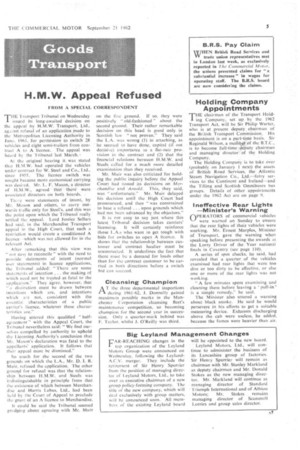H.M.W. Appeal Refused
Page 7

If you've noticed an error in this article please click here to report it so we can fix it.
FROM A SPECIAL CORRESPONDENT
THE Transport Tribunal on Wednesday . issued its to.ng-awaited decision on the appeal by H.M.W:. Transport, Ltd., ag.onst refusal of an apPlicatiOn made to the Metropolitan Licensing Authority in June, 1961, for pernaission to switch 28 vehicles and eight semi-trailers from contract A to A licence. The appeal was heard by the Tribunal laSt. March...„ At the original hearing it, was stated That H.M.W. had operated the vehicles under contract for W. Steel and Co., Ltd., since 1955. The licence switch .. was sought because more economical carrying was desired. Mr. L. F. Mason,. a 'director of HAMM., .agreed that there-. were • associated directors on both Wards. • Th.n-e were statements of intent, by Mr. Mason and •others, to _carry outwards traffic only for Steel's, and this was the point upon which the Tribunal really settled the appeal. Lord Justice Sellars had said, in the Merchandise Transport appeal in the High Court, that such a restriction would create a conditioned A licence-which was not allowed for in the relevant Act.
After remarking that this view was " not easy to reconcile" with the need to provide statements of intent (normal user statements) in licence applications,. the Tribunal added: "There are some statements of intention ... the making of which need not be treated as fatal to the application." They agree, however, that
a distinction must be drawn between intentions which are, and intentions which are not, consist'ent with the essential -characteristics of a public carrier's licence, whatever these characteristics are."
Having uttered this qualified " halfagreement " with the Appeal Court, the Tribunal nevertheless said: "We find ourselves compelled by authority to uphold the licensing Authority's conclusicirt that Mr. Mason's declaration was fatal to the appellants application. It follows that their appeal must be dismissed."
So much for the second of the two grounds on which the L.A., Mr. D. I. R. Muir, refused the application. The other . ground for refusal was that the relationship between 1-I.M.W. and Steels was indistinguishable in principle from that. the existence of which between Merchandise and Harris Lebus, Ltd., had been held by the Court of Appeal to preclude the grant of an A licence to Merchandise.
It could be said the Tribunal seemed grudging about agreeing with Mr. Muir on the first ground. If so, they were positively " old-fashioned" about the second ground. Their rather remarkable decision on this head is good only in Scottish law "not proven." They said the L.A. was wrong (I) in attaching, as he seemed to have done, capital (if not decisixe) importance to_ a flat-rate provision in the contract and (2) that the financial relations between H.M.W. and Steels called for a much more detailed examination than they received.
Mr. Muir was also Criticized for holding the public inquiry before the Appeal Court had issued its decisions on Mer chamliw and Arnold.This, they said, was "unfortunate." Mr. Muir delayed his decision until the High Court' had pronounced, and then "was constrained to base a refusal . . . upon grounds which had, not been advanced by the objectors."
It is not easy to say just where this latest Tribunal decision takes carriers' licensing. It will certainly reinforce those L.A.s who want to get tough with bids for switches to open A licence. It shows that the relationship between customer and contract haulier must be unconnected. It underlines the fact that there must be a demand for loads other than for the contract customer to be carried in both directions before a switch bid can succeed.
Cleansing Champion AT the three departmental inspections during 1961-62, J. Donnelly gained maximum possible marks in the Manchester Corporation cleansing fleet's maintenance competiticin, so becoming champion for the second year in succession. Only a quarter-mark behind was F. Taylor. whilst J. O'Reilly was third.










































































































































































































































































































































